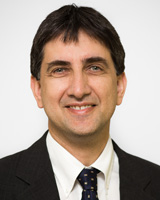
Stephen Hashmi
University of Heidelberg
Gold Catalysis: From Ligands to Materials
Abstract
Prof. Dr. A. Stephen K. Hashmi studied Chemistry at Ludwig-Maximilians-University Munich, Germany (Diploma thesis 1988) and got his PhD in 1991, both with Prof. G. Szeimies, both on highly strained organic compounds.
In 1991-1993, he joined the group of Prof. B. M. Trost at Stanford University, California, USA, as a postdoctoral fellow and workied on Enyne metathesis and related reactions.
Prof. Dr. Hashmi got his Habilitation in the group of Prof. Dr. J. Mulzer, in 1993-1998 at the Institute of Organic Chemistry of Free University Berlin, Germany, Institute of Organic Chemistry of Johann Wolfgang Goethe-University Frankfurt, and then in the Institute of Organic Chemistry of University of Vienna, Austria.
He was visiting scientist at the University of Tasmania, Hobart, Australia, in 1999, temporary Professorship for organic chemistry at the Department of Chemistry of Philipps-University Marburg, in 1999/2000. From 2001-2007, he became Professor for Organic Chemistry at the Institute of Organic Chemistry of Stuttgart University.
Since 2004, he is Chair for Organic Chemistry at the Institute of Organic Chemistry of the Ruprecht-Karls-University Heidelberg.
In 2010/2012, he was Dean of the Department of Chemistry and Earth Sciences of the Ruprecht-Karls-University Heidelberg, and then Vice Dean of the Faculty of Chemistry and Earth Sciences.
Since 2013, he is Vice-Rector of Ruprecht-Karls-University Heidelberg and Vice-President Research and Transfer of Heidelberg University.
His research is focused on Ligand development, methodology development, and detailed mechanistic studies in homogeneous transition‐metal catalysis; mechanistic studies include isotope labeling, in situ spectroscopy from IR to EXAFS, and computational chemistry. In addition, the development of highly active catalysts by efficient modular methods is a focus of current activities.
He received many awards and distinctions, such as the Hector Research Prize 2010 and ORCHEM Prize for Natural Scientists. He is author of more than 250 publications. He is member of the Editorial Board of Chemistry—A European Journal (Wiley-VCH), Member of the Academic Advisory Board of Advanced Synthesis & Catalysis (Wiley VCH), Member of the Internatioal Advisory Board of ChemCatChem (Wiley-VCH), among others.